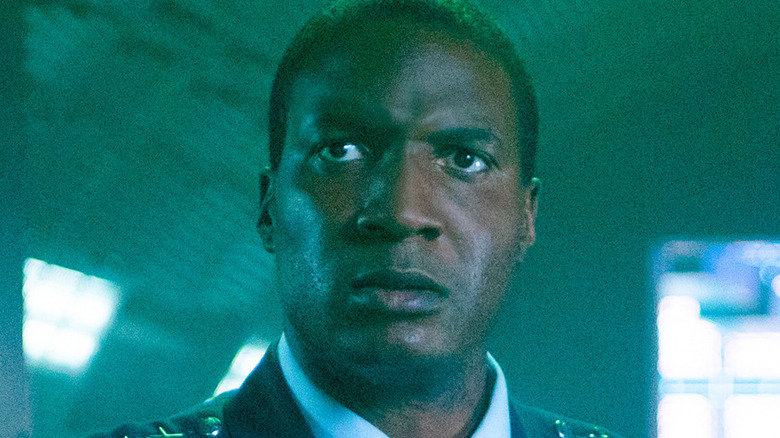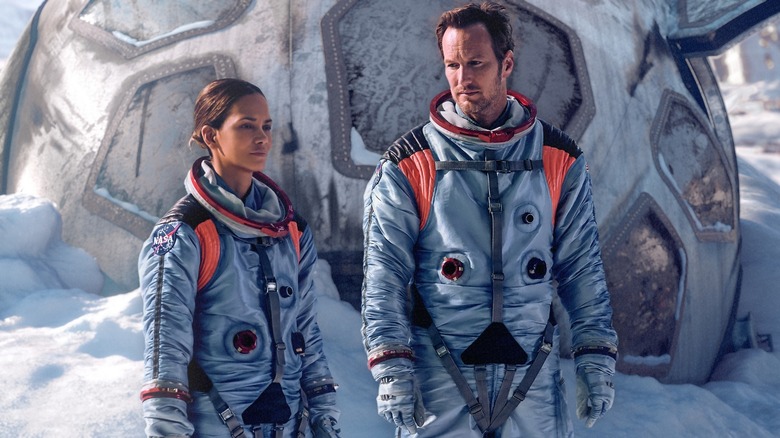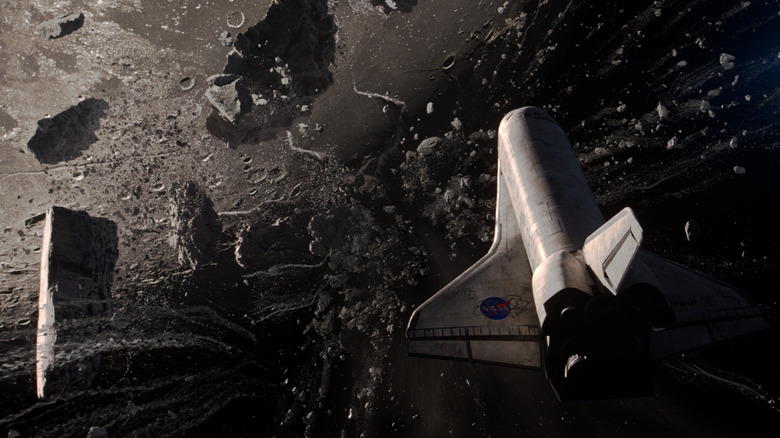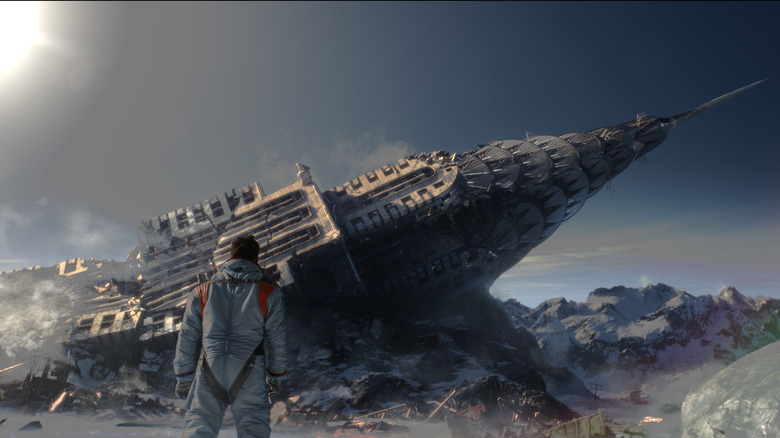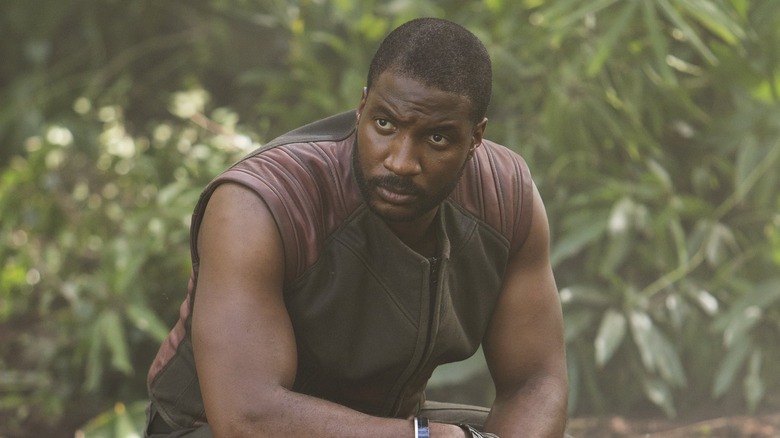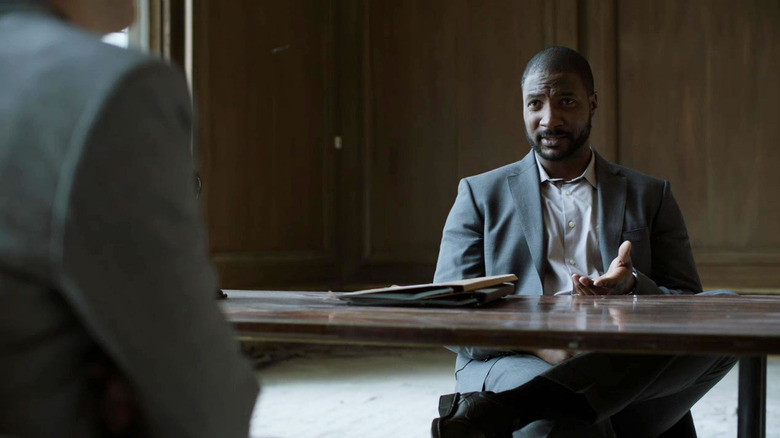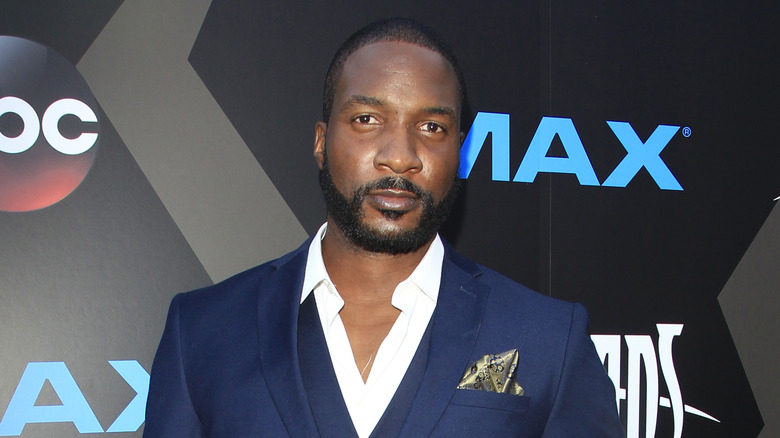Eme Ikwuakor On Facing Extinction In Moonfall, What Happened With Inhumans And More - Exclusive Interview
After taking up acting at the University of Colorado in his home state, Eme Ikwuakor moved to Los Angeles upon graduating college to pursue a career on the screen. While working at day jobs for three years to support himself, Ikwuakor collaborated on a short film called "Chance" which changed his life. The project gave him the motivation to quit his other jobs and pursue acting full-time — a decision which has panned out well.
Since making that jump, Ikwuakor began landing gigs on well-known series such as "Castle," "Hawaii Five-0" and "Extant." He then secured roles on two high-profile genre shows in a row: first as Royal Family member Gorgon on the ill-fated Marvel show "Inhumans," then as a fixer for the dystopian Management on the acclaimed Starz series "Counterpart," with J.K. Simmons. Now, Ikwuakor is about to be seen in his biggest film role to date, in director Roland Emmerich's sci-fi disaster epic "Moonfall."
Ikwuakor plays Doug Davidson, an Air Force chief of staff and the estranged husband of NASA deputy director Jocinda Fowler (Halle Berry). Davidson and Fowler coordinate the military and scientific response to the discovery that the Moon is falling out of its orbit and heading toward Earth, possibly under the influence of a mysterious force that arrived a decade earlier.
Next up for Ikwuakor is "The Gray Man," directed by Anthony and Joe Russo, and starring Chris Evans, Ana de Armas, and Ryan Gosling. At the moment, Ikwuakor is excited about "Moonfall," which also features John Bradley and Patrick Wilson. "I don't think anything is unbelievable as long as you have the research and the belief behind it," he tells Looper about the movie's wildly over-the-top premise. "That's what science fiction is for ... to ask those questions and see it played out on a screen in front of us to have those conversations later."
Eme Ikwuakor wanted badly to be in Moonfall
What was the hook for you with this? Was it working with Roland? Working with Halle and Patrick Wilson? The concept? Or all three?
For me, it's actually all three. One of the reasons why I even came into this industry was to do movies like this. I came from sports, so [I like doing] anything where I could be physical ... I had posters on my wall of Will Smith and "Independence Day" and these different types of movies. Roland Emmerich was literally one of these dream directors that I wanted to work with. When the opportunity came — and then especially with Halle Berry and Patrick Wilson and all the other people in regards to this cast and especially the story — I was so hooked.
How would you best describe your character?
He's a head chief of staff of the Air Force. Basically, when the Moon is coming to Earth, we all have to come together to try to stop this thing. This character is the estranged husband of Halle Berry's character and they have a kid together. There's a huge element of work/life and work/leisure balance. I think, for a lot of these characters in the movie, [you can ask] "Where are their priorities, especially when the end of the world is happening? Where are you? What regrets could you have?" It's different elements and themes of that nature.
One of the things that Roland is always good at with these spectacles that he does put in characters who are having these everyday problems that don't go away even if the Moon's falling on you or the Earth is splitting apart or aliens are landing. Would you say that's a good way to describe the way your character and the other characters interact with this situation?
Yeah, because it comes in a spot where no one sees this coming. At the same time as this thing is coming, we still have our previous responsibilities that we have to take care of. There's so much that people are having to do, double tasks, in regards to helping save the world or helping protect somebody. And at the same time, how do you hold everybody together?
Halle's character was originally conceived as a man. When they flipped that around, was your character flipped too?
Oh, I have no idea. You actually told me something right now that I didn't know. I found out basically 15 seconds ago.
How to shoot a space movie during a pandemic
The screenplay has some pretty wild ideas in it about the Moon, especially the whole idea of it not being a natural object. Do you find these kinds of theories intriguing?
I don't think anything is unbelievable as long as you have the research and the belief behind it. I'll engage with anybody in regards to a conversation as long as it's researched. With these elements of the Moon, of what the Moon is and what makes up the Moon, I'll always dive in. That's what science fiction is for. Science fiction gives us the opportunity to ask those questions and see it played out on a screen in front of us to have those conversations later. If one of those conversations comes up after they see this movie, then I think that's a win.
What was it like shooting the movie under COVID protocols? And do you recall your best day on set?
I think I started [at the] end of November into December (2020). It was in the middle of COVID. The very first thing I had to do was quarantine in Canada for two weeks in a room by myself. I literally couldn't even leave to take out the trash, but to me, I thought it was a really good time to research. I literally brought nothing except my script and my computer, and was able to live in this character for two weeks. I had a gym in my room where all I had to do was work out every single day and (look at the) script for two weeks. It really got me into the mindset of this guy who was in this situation because he has chosen work over a lot of other things.
Being in that single mindset helped a lot, especially with filming. Then, at the exact same time, we had protocols. We had to make sure that there wasn't a COVID outbreak on set. It was such a massive, massive production, that we had to make sure that it continued.
One of my favorite days was my last day of shooting because it was the longest. Right then, we had to finish because we were about to go on break. It was a long, 17-hour day to basically get all these things hammered out. It's one of those things — you just have to keep going. You just have to keep moving.
On working with the master of disaster
People definitely have an image of Roland Emmerich as the "master of disaster." What do you think would surprise people about him as a director?
He was, for me, so much more laid back. He has this huge production and so much stuff is going on around him, but he's so confident in regards to what he wants to see that ... being on that set for that day for 17 straight hours, there was just that calm. You know what I mean? I felt [it was] a safe spot where I could just play. For someone who goes around making movies about destroying the Earth in so many different types of ways, there's such a vision. He's such a visionary. It was such a pleasure to work with him and with everybody involved.
Why do you think people respond to these types of films? Whether it's "The Towering Inferno" from the '70s, "Deep Impact" or things like that from the '90s, or the movies Emmerich has done more recently. These things don't seem to go out of style.
I think we have opportunities to play with our imaginations. It's really cool to see someone who can do it so well. At what other point can you watch a film about the Moon coming to Earth and you still are alive to see it happen? You know what I mean? Especially with technology nowadays to make these things look so real, you escape for that moment and be like, "Well, what would I do in this situation?" I think it's a gift of storytelling that'll never go away.
Eme was in Inhumans and lived to talk about it
Many of our readers probably saw you as Gorgon in Marvel's "Inhumans." What's your perspective now on that experience? Do you think it deserved a second chance? Do you perhaps recall where things started to go off track with that?
One of the things I always wanted to do was to play a superhero. That was one of my goals. Being able to do that was actually a dream. It was playing this character of size in Hawaii, with such an amazing cast who are still all friends today. That's a gift that I'll never take away.
I wish that it would have been better received. I absolutely do. You can't help what people are going to like and what people don't like. I think one of the things that made it a little bit tough was the way that it was released. We were getting compared to movies instead of being compared to, in my opinion, [what] would have been an ABC television show. I think that's probably one of the things that made it difficult to really get off the ground because they're expecting to see "Thor: Ragnarok" on TV when we had the budget for something on The CW or "Agents of S.H.I.E.L.D."
If you put "Agents of S.H.I.E.L.D." next to "Thor: Ragnarok," it's not an even comparison, so I think that's what made it tough to get off the ground to begin with. Plus, the fact that people thought that we were trying to replace the X-Men, which we weren't trying to do at all — it sucks because you wish that it could have gone farther and you wish you could have done more, but it was still a gift to do it, and the relationships that we had were amazing.
If you could come back into the Marvel universe as a different character, who would you want to play?
I like the Blade character. I like that or Bishop, which I absolutely love. Those two characters are awesome. At the same time, I'm going to switch sides here a little bit and I might get hated on here, but I've also been in love with the story of Superman and the Man of Steel. The idea of a person that's coming from another place to help people that he doesn't know is a story that has really attracted me a lot. I don't know if it's because of me being African American and growing up in a spot that wasn't very diverse. It's like, "How is this person that could be considered an outsider coming in and trying to function and relate into a world where people might feel and look at him as different?" Superman, to me, has been always been a character I admire.
Going 'Gray' with the Russos and why Counterpart was ahead of its time
You recently worked on "The Gray Man" with the Russo brothers. What's that been like and how is it working with those guys and with Chris Evans?
Well, that was, to me, a huge full circle because I always wanted to do Marvel. I always wanted to get into the Marvel movies, even though getting "Inhumans" and TV was great. Being able to go full circle and work with the Russos was such a dream because I wanted to work with them so bad ... "The Gray Man," as much as I could say, it's a spy espionage story. I could just leave it there. [I'm] working with such heavy hitters in regards to directors, producers, and especially the actors. I don't want to give too much away in regards to that so I don't want to give anything in the script of who I actually worked with and who I did not.
You also appeared on the second season of "Counterpart." Was that show ahead of the pack in talking about parallel worlds and multiverses?
That show was so good. Right when the pandemic started, I was like, "Oh my God, this is 'Counterpart.'" The two different worlds and how we had to start sanitizing was literally the start of this. I was working with J.K. (Simmons) and a guy named Nicholas Pinnock. [He] is almost a mentor to me now. These people, you have to show up to work and do the work. These people are incredible actors, and the story that (Justin) Marks made was — the storytelling was almost flawless. That show was so good and I strongly recommend anybody see it.
Eme's inspiring leap of faith
You came out to LA early in your career, worked some day jobs to support yourself, then decided to quit and pursue acting full-time. What gave you the confidence to make that leap?
There's a few things that happened. One, when I was working this day job [at the Capital Grill restaurant in the Beverly Center mall], I realized that this was not the reason why I came out here. I was like, "I can make all this money, but all this money isn't going towards why I came out here." Right before that, I was talking to my friend, Brad, who's a director and he's like, "Let's work on this piece." I wrote this short film called "Chance" and it was supposed to be a two-day shoot. After the first day, [Brad] calls me up and he says, "The film's done." I'm like, "What are you talking about? We still have another day of filming." He's like, "No, just watch the film. The film is done."
I'm watching it just to make sure that it's done. And no lie, on the 50th time, I just started crying. I watch it again and I started crying again in the exact same spot, and then I started realizing — I say this line in the movie, "I was living in a state of regret." Because the whole idea is that he meets this girl downtown, they pass each other, and he never says hi. The entire movie is him imagining what that day would have gone like, and you realize at the end that he never even said "Hello." Didn't even say hello and just walked past. At that moment, I just realized so many people live in that state of "what if."
I remembered I came back to work and I had a double that day. I worked the first shift and then I went and I sat in my car. I'm a spiritual man and I just prayed. Then all of a sudden, I had this calm over me and I was like, "I'm going to quit." So I walked in to the office and I was just like, "Hey, I'm going to quit, I'm putting in my two weeks." And [the manager] was like, "Well, what are you going to do?" I was like, "I don't know, but I'll figure it out." At that point, I didn't even have enough money to pay for rent the next month. I was like, "This is what I've got to do, and I believe in myself that I can do it." That was about seven, eight years ago. Since then, I haven't had a day job.
"Moonfall" premieres exclusively in theaters on Friday, February 4.
